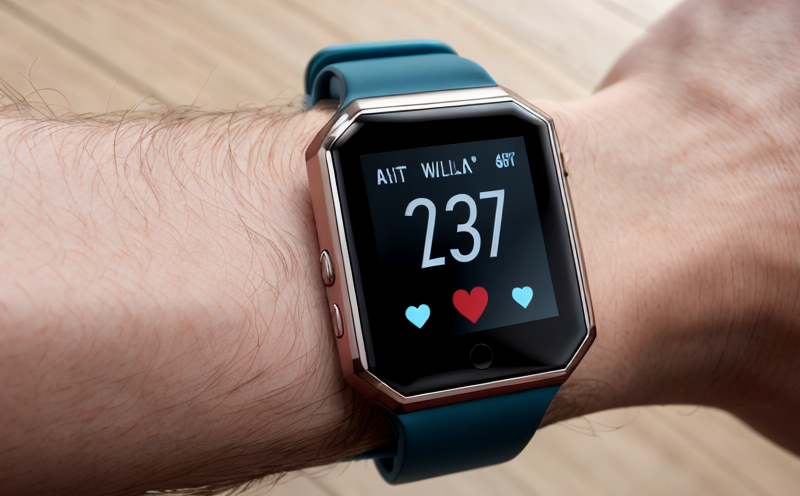Accuracy and Reliability Testing for Physiological Wearables
The accuracy and reliability of physiological wearables are paramount in ensuring patient safety and effective clinical outcomes. These devices, which include smartwatches, fitness trackers, and other health monitoring gadgets, are designed to measure critical parameters such as heart rate, blood oxygen levels, and more. As the demand for wearable technology continues to grow, so does the need for rigorous testing that guarantees these devices perform accurately and reliably.
In the medical device sector, accuracy is not only a technical requirement but also a legal one. Compliance with international standards like ISO 17025 ensures laboratories are capable of conducting accurate tests on complex physiological wearables. These standards mandate precise calibration methods and proficiency in handling diverse environmental conditions that could affect performance.
The testing process for accuracy involves several critical steps, starting from the initial design review to final validation. During this phase, engineers must ensure that each component is correctly calibrated according to specified tolerances. This includes verifying the sensor's accuracy against known standards and ensuring it functions correctly across various temperature ranges.
Once designed, the next step is real-world testing under controlled conditions that mimic actual user environments. For heart rate monitors, this could mean testing in both warm and cold climates, while for blood oxygen devices, altitude changes might be simulated. The goal here is to confirm not only accuracy but also consistency across different settings.
Reliability testing focuses on the longevity and performance stability of these devices over time. This involves long-term exposure to stress factors such as humidity, temperature fluctuations, and mechanical wear. By subjecting the device to these conditions, we can assess its durability and ensure it remains accurate even after extended use.
Another important aspect is cross-device calibration checks. Since many physiological wearables are paired with smartphones or other applications for data analysis, ensuring seamless integration between devices is crucial. This involves verifying that the information transmitted from one device to another is consistent and accurate.
The results of these tests are then meticulously documented and reported according to ISO 17025 guidelines. These reports serve as a critical tool for manufacturers and regulatory bodies, providing them with concrete evidence of product reliability and compliance. They also help in identifying any areas where improvements can be made, leading to better products.
For quality managers and R&D engineers looking into this service, understanding the intricacies involved is key. It helps in setting realistic expectations about what these tests entail and how they contribute to overall product quality. Compliance officers should also familiarize themselves with these processes as they directly impact regulatory compliance efforts.
In summary, accuracy and reliability testing for physiological wearables involve multiple stages aimed at ensuring consistent performance across various conditions. By adhering to strict standards and conducting comprehensive tests, we can provide reliable data that supports better healthcare decisions and enhances patient safety.
Benefits
The benefits of accuracy and reliability testing for physiological wearables are manifold, spanning from enhanced product quality to improved user confidence. By ensuring these devices meet stringent standards, manufacturers can rest assured that their products will function correctly under all intended use scenarios.
User confidence is significantly bolstered when they know the data provided by their wearable device is accurate and reliable. This trust translates into higher satisfaction rates among users, which in turn fosters brand loyalty. Moreover, healthcare professionals benefit greatly from having reliable devices that provide precise information about patients’ health statuses.
For manufacturers, meeting these testing criteria opens up access to various markets and certifications required for selling medical devices internationally. Compliance with international standards like ISO 17025 not only ensures quality but also simplifies the regulatory approval process in different regions.
The environmental impact of this service is positive as well. By improving the accuracy and reliability of these devices, we reduce instances where incorrect data could lead to misdiagnosis or inappropriate treatment plans. This results in fewer unnecessary medical interventions and overall better healthcare outcomes.
Finally, it's worth noting that reliability testing helps extend the lifespan of wearable devices, reducing waste and promoting sustainability within the industry. With increased longevity comes reduced electronic waste, contributing positively towards environmental conservation efforts.
Customer Impact and Satisfaction
One of the primary goals in conducting accuracy and reliability testing for physiological wearables is to enhance customer satisfaction by delivering high-quality products. When customers know their wearable devices are accurate, they feel more confident using them, which leads to greater satisfaction.
The impact extends beyond just user confidence; it also affects how healthcare providers perceive these devices. If a wearable device consistently provides reliable data, doctors and nurses can rely on it during critical moments, potentially improving patient care significantly.
Manufacturers who invest in robust testing processes not only meet but exceed regulatory requirements, thereby gaining competitive advantages in the market. They also build strong relationships with customers through transparent communication about test results, which further enhances brand reputation and loyalty.
In terms of sustainability, reliable devices reduce the need for frequent replacements due to inaccuracies or failures, thus extending their useful life span. This reduces electronic waste and promotes more sustainable practices within the industry.
Environmental and Sustainability Contributions
The environmental benefits of conducting accuracy and reliability testing for physiological wearables are substantial. By ensuring these devices perform accurately and reliably, we reduce instances where incorrect data could lead to unnecessary medical interventions or treatments.
This reduction in inappropriate healthcare actions directly contributes to minimizing the overall carbon footprint associated with medical practices. Additionally, reliable devices last longer without requiring frequent replacements, leading to reduced electronic waste.
Moreover, by promoting accurate and reliable wearables, we encourage more efficient use of resources since these devices are less likely to be discarded prematurely due to malfunction or inaccuracy. This promotes a culture of sustainability within the healthcare sector.





